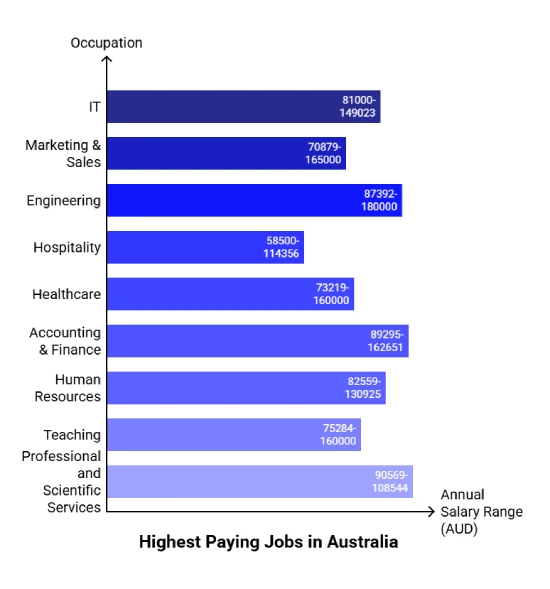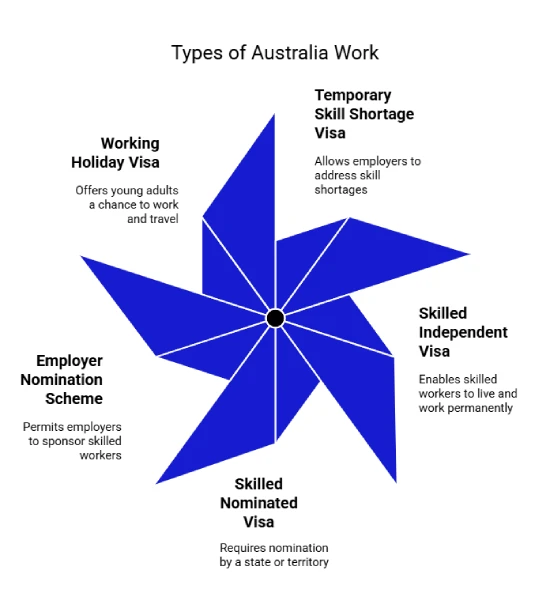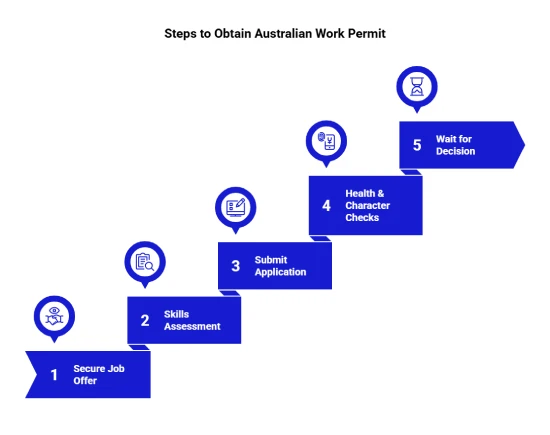Highest Paying Jobs in Australia
Australia's job market is great for skilled workers, offering many chances for well-paying jobs in different fields. In the recent times, the economy is expected to keep growing, with a need for experts in tech, healthcare, engineering, and finance. With a good quality of life, solid labor laws, and a lively job scene, Australia is still a popular choice for anyone wanting to advance their career and earn a good income.
|
Occupation |
Annual salary in AUD |
|
IT |
$81,000 – $149,023 |
|
Marketing & Sales |
$70,879 – $165,000 |
|
Engineering |
$87,392 – $180,000 |
|
Hospitality |
$58,500 – $114,356 |
|
Healthcare |
$73,219 – $160,000 |
|
Accounting & Finance |
$89,295 – $162,651 |
|
Human Resources |
$82,559 – $130,925 |
|
Teaching |
$75,284 – $160,000 |
|
Professional and Scientific Services |
$90,569 – $108,544 |

Why Work in Australia?
Australia's job market is pretty appealing for skilled workers, with plenty of chances to land high-paying jobs in various fields. It seems like the economy will keep growing, especially in tech, healthcare, engineering, and finance. The country has a good quality of life, fair labor laws, and a vibrant job market, making it a popular spot for those seeking career advancement and better pay.
International workers find Australia attractive thanks to its solid economy, high living standards, and cultural mix. The job market is well-regulated, with competitive salaries, great benefits, and room for career growth. With lots of job openings and a steady need for skilled workers, Australia is a great place for personal and professional development.
- Strong Economy: Australia’s economy is on the rise, driven by key sectors like healthcare, IT, engineering, and finance.
- Lots of Jobs: There are over 200,000 job openings expected currently, offering a variety of job options.
- Worker Rights: Australia’s labor laws help protect workers and promote a fair workplace.
- Diverse Work Environment: Australia’s multicultural scene creates a welcoming work environment for people from all backgrounds.
- Route to Permanent Residency: Skilled workers can apply for permanent residency, providing job security and stability.
.webp)
Australia Work Permit
An Australia work permit allows foreign nationals to work legally in the country. To apply for a work visa, applicants typically need a valid job offer from an Australian employer. Work permits are typically employer-sponsored, allowing individuals to live and work in Australia for a specified period. Australia aims to grant work permits to over 100,000 skilled workers across key sectors.
*Willing to migrate to Australia? Talk to Y-Axis for complete guidance.
Types of Australia Work Visas
Australia offers a variety of work visas to accommodate skilled professionals, business owners, and other workers seeking to live and work in the country. Below is a summary of the main types of work visas available:
Temporary Skill Shortage Visa (TSS - Subclass 482)
This visa allows skilled workers to fill labor shortages in Australia. It is employer-sponsored and helps employers hire workers for positions that cannot be filled by local talent. The TSS visa is granted for a period of up to four years, depending on the occupation and job offer.
Skilled Independent Visa (Subclass 189)
This visa is designed for skilled workers who are not sponsored by an employer, family member, or state/territory. It allows you to live and work anywhere in Australia. Applicants must meet points-based eligibility criteria, such as skills, work experience, and language proficiency.
Skilled Nominated Visa (Subclass 190)
This visa is for skilled workers who have been nominated by an Australian state or territory government. It allows the holder to live and work permanently in Australia. In addition to meeting basic eligibility requirements, applicants must score enough points in the points test and be nominated by the state or territory.
Employer Nomination Scheme (Subclass 186)
This permanent residence visa allows skilled workers to be sponsored by an Australian employer to fill a position in the company. Applicants must have a job offer from an employer in Australia, and the position must be full-time and permanent. This visa requires a skills assessment and proof of relevant work experience.
Working Holiday Visa (Subclass 417)
This visa is aimed at young individuals aged 18 to 30 from eligible countries (including Australia). It allows them to travel and work in Australia for up to one year, with the option to extend for an additional year if certain work requirements are met. This visa is ideal for those looking for temporary work and a cultural exchange experience.
Each visa type has different requirements and benefits, so choosing the right one depend on your skills, work experience, and intentions in Australia.

*Want to work in Australia? Talk to Y-Axis for complete guidance.
Requirements for Australia Work Visa
To apply for an Australian work visa, applicants need to fulfill several key requirements to ensure their eligibility. Below is a breakdown of the essential criteria:
Valid Job Offer: For most Australian work visa categories, applicants must have a confirmed job offer from an Australian employer. This is especially true for employer-sponsored visas such as the Temporary Skill Shortage Visa (TSS) and the Employer Nomination Scheme (subclass 186).
Skills Assessment: Applicants need to undergo a positive skills assessment. This process evaluates whether their skills and qualifications align with the nominated occupation. This is crucial for skilled migration visas, such as the Skilled Independent Visa (subclass 189) and the Skilled Nominated Visa (subclass 190).
Language Proficiency: English language proficiency is a vital requirement for Australian work visas. A minimum IELTS score of 6.0 or an equivalent score in other approved tests like TOEFL or PTE is typically needed.
Age Limit: Generally, applicants must be under 45 years of age. This requirement applies to most skilled visas, such as the subclass 189 and subclass 190, where age is an important factor in the points-based selection process.
Health and Character Requirements: Applicants must meet specific health standards and provide police clearance certificates from all countries they have resided in for 12 months or more during the past 10 years. This ensures that applicants are not only medically fit to work in Australia but also of good character.
Meeting these criteria is essential for obtaining a work visa to Australia, and ensuring all documentation is accurate and complete is crucial for a smooth application process.
Highest Paying Jobs/Occupations in Australia
Australia is known for offering competitive salaries, especially in industries experiencing high demand. There are several occupations stand out for their high earning potential. The job market remains dynamic, with growing opportunities in sectors such as healthcare, technology, engineering, and finance. Here are some of the highest-paying jobs in Australia:
Surgeons and Medical Specialists
Surgeons and other medical specialists in Australia continue to earn top salaries, ranging from $200,000 to $500,000 annually. This high demand is driven by Australia's aging population and an increasing need for healthcare professionals. Specialties such as orthopaedics, anaesthesia, and cardiology offer the highest salaries.
IT Managers and Software Engineers
With Australia's technology sector expanding rapidly, IT professionals earn between $120,000 and $180,000 annually. As businesses increasingly rely on digital solutions and software, the demand for qualified IT managers and software engineers continues to grow.
Human Resources Management Jobs
HR professionals, including HR directors and managers, can expect to earn between $100,000 and $170,000 annually. As businesses in Australia continue to focus on talent acquisition, employee development, and organizational health, HR professionals play a critical role. HR managers overseeing recruitment strategies, employee relations, and compensation packages remain in demand.
Hospitality Jobs in Australia
The hospitality industry offers high-paying positions such as hotel managers, chefs, and event coordinators. Salaries in this sector range between $80,000 and $150,000 annually for senior management roles. With Australia being a major tourism destination, the hospitality sector continues to thrive, offering opportunities for skilled professionals in the culinary arts, hotel management, and customer experience.
Financial Managers and Directors
Australia’s financial services sector is thriving, with financial managers and directors earning between $150,000 and $200,000 annually. With a stable economy and a diverse financial market, these professionals are integral to managing corporate finances, investments, and risk.
|
Role |
Salary (Australia) |
|
Accountant |
$95,000 |
|
Accounting Manager |
$135,256 |
|
Accounts Payable Specialist |
$73,088 |
|
Accounts Receivable Specialist |
$70,000 |
|
Auditor |
$101,699 |
|
Controller |
$112,595 |
|
Payroll Specialist |
$99,788 |
|
Tax Accountant |
$95,000 |
|
Administrative Assistant |
$68,367 |
|
Data Entry Clerk |
$63,375 |
|
Office Manager |
$88,824 |
|
Project Manager |
$125,000 |
|
Health and Safety Officer |
$86,492 |
|
Human Resources Officer |
$78,735 |
|
Recruiter |
$85,000 |
Engineering Managers
Engineering managers, especially those in civil and mechanical engineering fields, can expect to earn $100,000 to $180,000 annually. These professionals are crucial for overseeing large infrastructure projects, ensuring compliance with regulations, and managing project teams. As infrastructure projects expand in Australia, this role remains in high demand.
Australia continues to be an attractive destination for skilled workers in these high-demand sectors. With competitive salaries and a robust job market, professionals in these fields have significant opportunities to build their careers in Australia.
|
Role |
Salary (Annually) |
|
Aerospace Engineer |
$110,000 |
|
Biomedical Engineer |
$98,371 |
|
Chemical Engineer |
$120,000 |
|
Civil Engineer |
$111,996 |
|
Design Engineer |
$113,076 |
|
Electrical Engineer |
$120,000 |
|
Environmental Engineer |
$102,500 |
|
Industrial Engineer |
$100,004 |
|
Mechanical Engineer |
$113,659 |
|
Mining Engineer |
$145,000 |
|
Project Engineer |
$125,000 |
|
Software Engineer |
$122,640 |
|
Systems Engineer |
$120,000 |
Teaching Jobs in Australia
Teachers, especially those in specialized fields such as STEM, can earn between $70,000 and $100,000 annually. While public school teachers may start with salaries around $70,000, senior and specialized roles, such as university professors or education managers, earn significantly more. The education sector is expanding, with a growing focus on higher learning and specialized skills.
Nursing Jobs in Australia
Nurses, particularly those in specialized fields such as nurse practitioners and nurse managers, earn between $80,000 and $130,000 annually. With an aging population and ongoing healthcare needs, nursing roles remain essential. Nurses in emergency, pediatric, and aged care roles are especially in demand across hospitals and private healthcare facilities. Applicants can choose a nursing career from a wide range of occupations listed below:
- Enrolled Nurse
- Nurse Educator
- Nurse Manager
- Nurse Practitioner
- Nurse Researcher
- Registered Nurse (Aged Care)
- Registered Nurse (Child and Family Health)
- Registered Nurse (Community Health)
- Registered Nurse (Critical care and Emergency)
- Registered Nurse (Developmental Disability)
- Registered Nurse (Disability and Rehabilitation)
- Registered Nurse (Medical Practice)
- Registered Nurse (Medical)
- Registered Nurse (Mental Health)
- Registered Nurse (Paediatrics)
- Registered Nurse (Perioperative)
- Registered Nurse (Surgical)
- Veterinary Nurse
Steps to Apply for Australian Work Permit
Step 1: Secure a Job Offer: Obtain a valid job offer from an Australian employer.
Step 2: Skills Assessment: Complete a skills assessment for your occupation with the relevant assessing authority.
Step 3: Submit Application: Complete and submit your work visa application through the Australian government’s official portal.
Step 4: Health and Character Checks: Undergo medical and character assessments.
Step 5: Wait for Decision: After submitting your application, wait for a decision from the Australian Department of Home Affairs.

How can Y-Axis assist you?
Y-Axis, the world's top overseas immigration consultancy, provides unbiased immigration services for every client based on their interests and requirements. Our impeccable services at Y-Axis include the following:
- Expert guidance for working in Australia
- Assistance in applying visa
- Coaching Services: IELTS/TOEFL Proficiency Coaching
- Free career consultation; book your slot today!
- Y-Axis jobs search service to help you get jobs in Australia.
Looking for Inspiration
Explore what Global Citizens have to say about Y-Axis in shaping their future
Frequently Asked Questions
